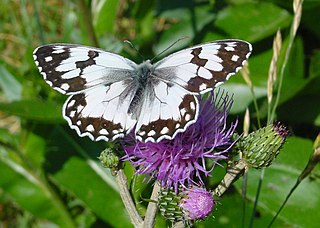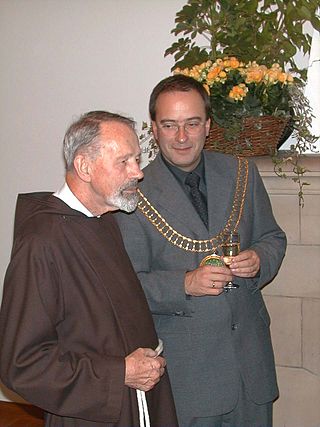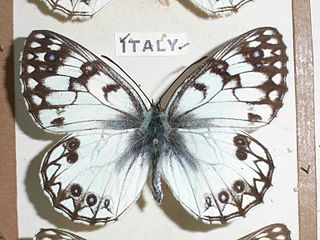
The Ordos Desert is a desert/steppe region in Northwest China, administered under the prefecture of Ordos City in the Inner Mongolian Autonomous Region. It extends over an area of approximately 90,650 km2 (35,000 sq mi), and comprises two sub-deserts: China's 7th-largest desert, the Kubuqi Desert, in the north; and China's 8th-largest desert, the Mu Us Desert, in the south. Wedged between the arable Hetao region to the north and the Loess Plateau to the south, the soil of the Ordos Desert is mostly a mixture of dry clay and sand, and as a result is poorly suited for agriculture.

Melanargia galathea, the marbled white, is a medium-sized butterfly in the family Nymphalidae. Despite its common name and appearance, this butterfly is one of the "browns", of the subfamily Satyrinae.

Axbridge Hill and Fry's Hill is a 64.8-hectare (160-acre) biological Site of Special Scientific Interest in the Mendip Hills, Somerset, notified in 1990. The hills are above the town of Axbridge, immediately to the east of Shute Shelve Hill.
Long Lye is an 11.7 hectare biological Site of Special Scientific Interest at Buckland St Mary in the Blackdown Hills, Somerset, notified in 1988.

Melanargia lachesis, the Iberian marbled white, is a butterfly species belonging to the family Nymphalidae.

Melanargia ines, the Spanish marbled white, is a butterfly species belonging to the family Nymphalidae. It can be found on the Iberian Peninsula and western North Africa.

Melanargia occitanica, the western marbled white, is a butterfly species belonging to the family Nymphalidae.

Pater Sigbert Wagener (OFMCap) was a German Capuchin priest, a teacher, a scientist and naturalist especially interested in entomology. He wrote

Melanargia russiae, or Esper's marbled white, is a butterfly in the family Nymphalidae. It is found in Spain, Portugal, south-eastern France, Italy, the Balkans, southern Russia, the Caucasus and western Siberia.

Melanargia arge, the Italian marbled white, is a butterfly of the family Nymphalidae. M. arge Sulz.. Above white, only the submarginal lunate line, the two short bands in the centre and at the apex of the cell, and the beautifully blue-centred ocelli being dark — ab. caeca Stgr. is without ocelli; rare among the preceding. It is an endemic species found only in the southern half of Italy and the eastern half of the Italian island of Sicily. It flies in May and June in a single generation in rocky places with abundant flowers. The caterpillar feeds on grasses.

Melanargia is a genus of butterflies belonging to the family Nymphalidae and the subfamily Satyrinae.

Melanargia titea, the Levantine marbled white, is a butterfly of the family Nymphalidae.

Psychostrophia melanargia is a moth of the family Epicopeiidae first described by Arthur Gardiner Butler in 1877. It is found in Japan.

Melanargia larissa, the Balkan marbled white, is a butterfly in the family Nymphalidae. It is found from south-eastern Europe and Asia Minor to Transcaucasia and north-western Iran. The habitat consists of dry grasslands, scrubby hillsides and grassy woodland glades. Adults are on wing from mid-May to July in one generation per year.

Stonesfield Common, Bottoms and Banks is a 27.45-hectare (67.8-acre) biological Site of Special Scientific Interest (SSSI) south of Stonesfield in Oxfordshire.














